MAR013-1 Intercultural Competence: A Detailed Cultural Autobiography
VerifiedAdded on 2023/06/18
|12
|4035
|298
Report
AI Summary
This report presents a cultural autobiography based on a questionnaire and an interview with a colleague to compare and contrast cultural similarities and differences. It includes an analysis of personal cultural awareness, detailing family background, values, and beliefs. The report also examines the influence of religion and cultural traditions on the author's life, including experiences with cultural shifts and adaptation. Furthermore, it incorporates a cultural autobiography of someone else, comparing both profiles using cultural frameworks to highlight cultural differences and similarities. The findings offer insights into intercultural competence, emphasizing the importance of understanding diverse perspectives in a business context. This document is available on Desklib, a platform offering a wide range of study tools and resources for students.
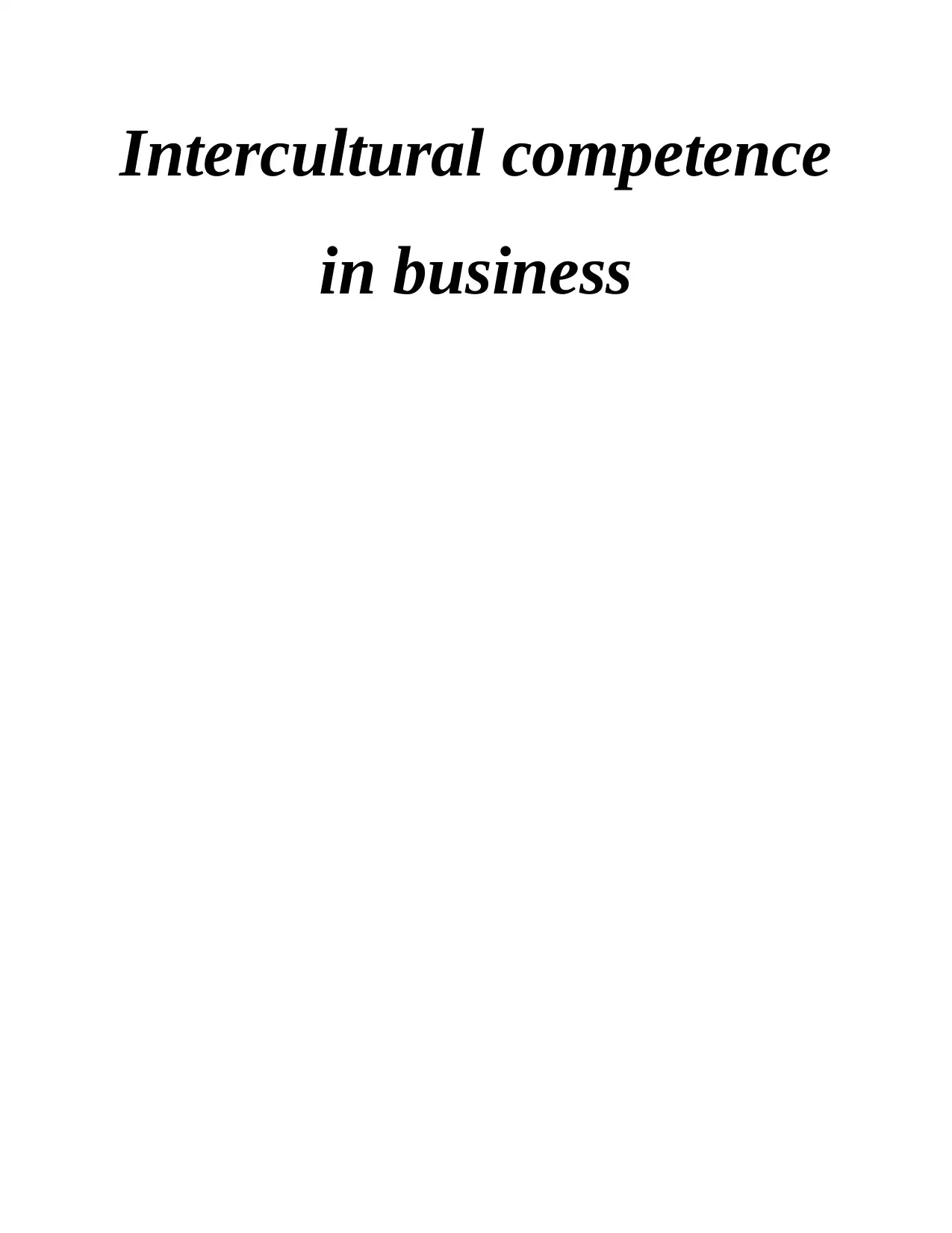
Intercultural competence
in business
in business
Paraphrase This Document
Need a fresh take? Get an instant paraphrase of this document with our AI Paraphraser
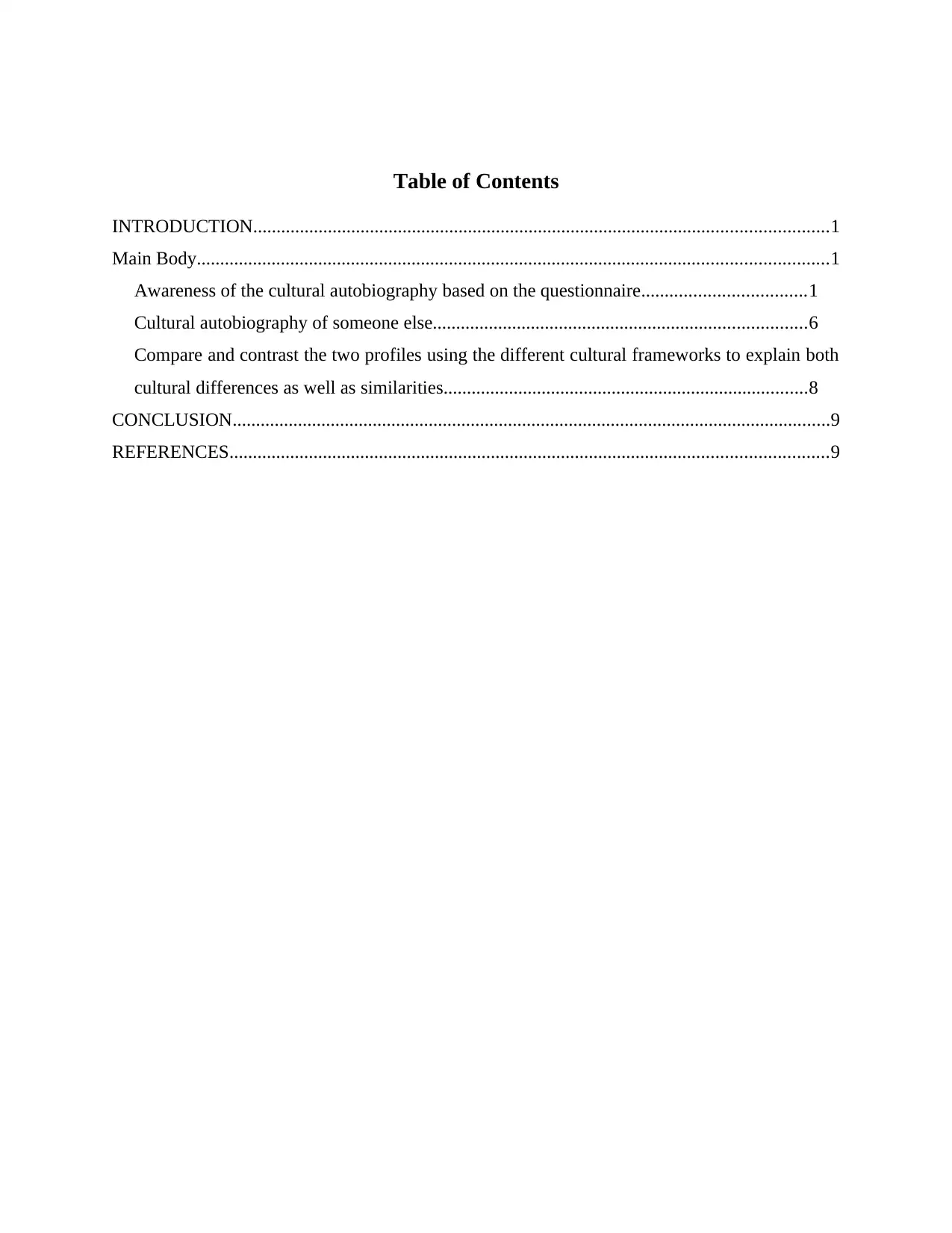
Table of Contents
INTRODUCTION...........................................................................................................................1
Main Body.......................................................................................................................................1
Awareness of the cultural autobiography based on the questionnaire...................................1
Cultural autobiography of someone else................................................................................6
Compare and contrast the two profiles using the different cultural frameworks to explain both
cultural differences as well as similarities..............................................................................8
CONCLUSION................................................................................................................................9
REFERENCES................................................................................................................................9
INTRODUCTION...........................................................................................................................1
Main Body.......................................................................................................................................1
Awareness of the cultural autobiography based on the questionnaire...................................1
Cultural autobiography of someone else................................................................................6
Compare and contrast the two profiles using the different cultural frameworks to explain both
cultural differences as well as similarities..............................................................................8
CONCLUSION................................................................................................................................9
REFERENCES................................................................................................................................9
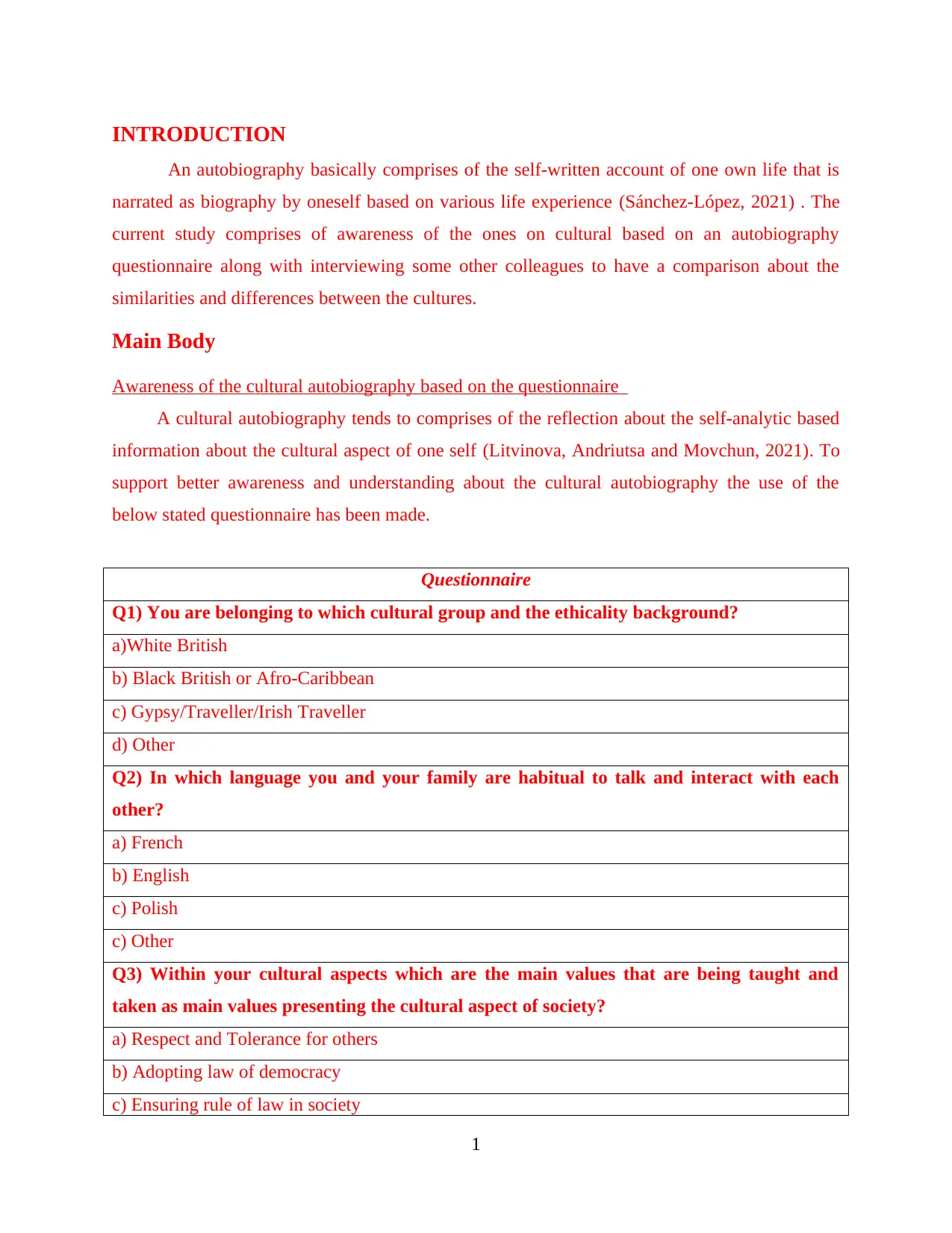
INTRODUCTION
An autobiography basically comprises of the self-written account of one own life that is
narrated as biography by oneself based on various life experience (Sánchez-López, 2021) . The
current study comprises of awareness of the ones on cultural based on an autobiography
questionnaire along with interviewing some other colleagues to have a comparison about the
similarities and differences between the cultures.
Main Body
Awareness of the cultural autobiography based on the questionnaire
A cultural autobiography tends to comprises of the reflection about the self-analytic based
information about the cultural aspect of one self (Litvinova, Andriutsa and Movchun, 2021). To
support better awareness and understanding about the cultural autobiography the use of the
below stated questionnaire has been made.
Questionnaire
Q1) You are belonging to which cultural group and the ethicality background?
a)White British
b) Black British or Afro-Caribbean
c) Gypsy/Traveller/Irish Traveller
d) Other
Q2) In which language you and your family are habitual to talk and interact with each
other?
a) French
b) English
c) Polish
c) Other
Q3) Within your cultural aspects which are the main values that are being taught and
taken as main values presenting the cultural aspect of society?
a) Respect and Tolerance for others
b) Adopting law of democracy
c) Ensuring rule of law in society
1
An autobiography basically comprises of the self-written account of one own life that is
narrated as biography by oneself based on various life experience (Sánchez-López, 2021) . The
current study comprises of awareness of the ones on cultural based on an autobiography
questionnaire along with interviewing some other colleagues to have a comparison about the
similarities and differences between the cultures.
Main Body
Awareness of the cultural autobiography based on the questionnaire
A cultural autobiography tends to comprises of the reflection about the self-analytic based
information about the cultural aspect of one self (Litvinova, Andriutsa and Movchun, 2021). To
support better awareness and understanding about the cultural autobiography the use of the
below stated questionnaire has been made.
Questionnaire
Q1) You are belonging to which cultural group and the ethicality background?
a)White British
b) Black British or Afro-Caribbean
c) Gypsy/Traveller/Irish Traveller
d) Other
Q2) In which language you and your family are habitual to talk and interact with each
other?
a) French
b) English
c) Polish
c) Other
Q3) Within your cultural aspects which are the main values that are being taught and
taken as main values presenting the cultural aspect of society?
a) Respect and Tolerance for others
b) Adopting law of democracy
c) Ensuring rule of law in society
1
⊘ This is a preview!⊘
Do you want full access?
Subscribe today to unlock all pages.

Trusted by 1+ million students worldwide
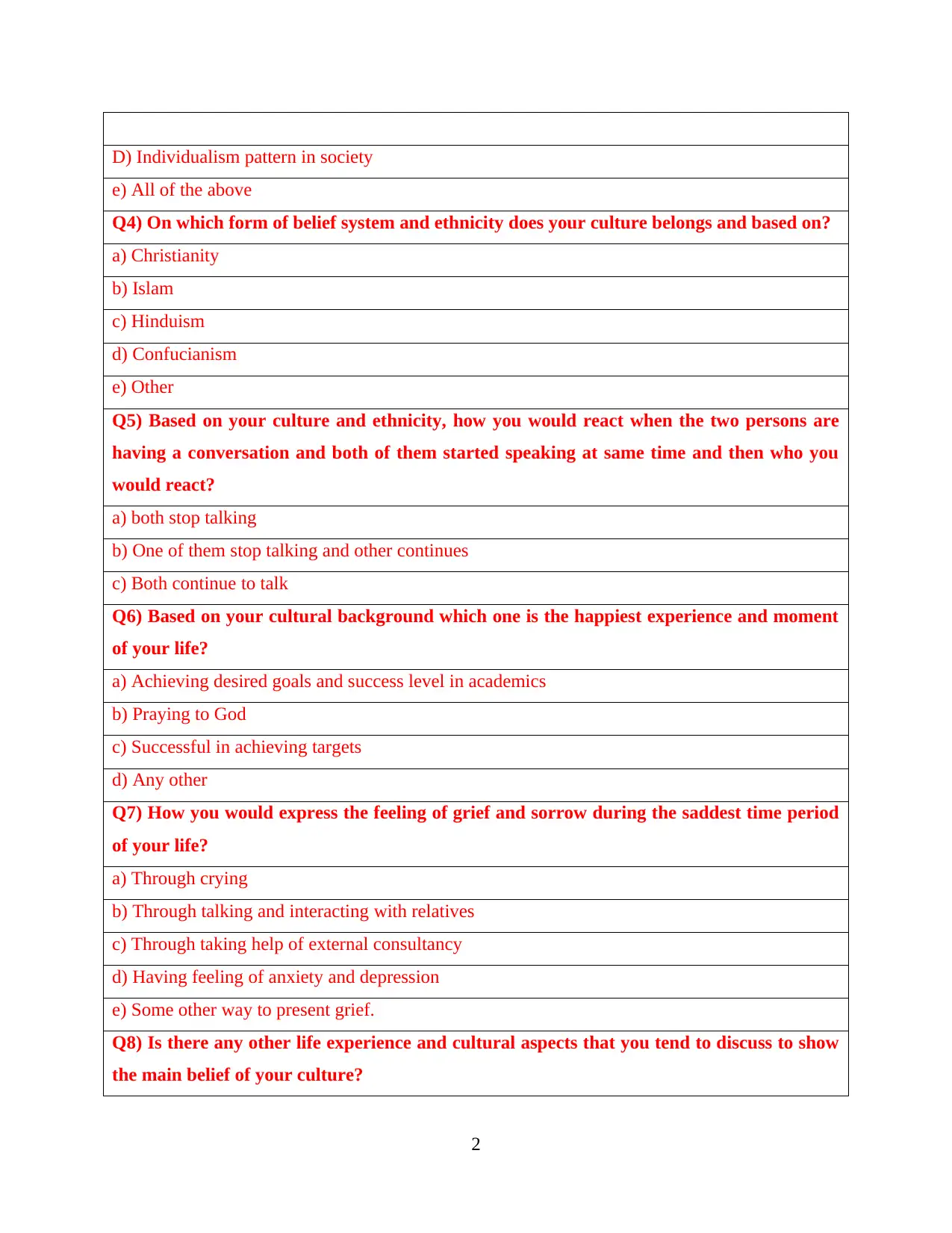
D) Individualism pattern in society
e) All of the above
Q4) On which form of belief system and ethnicity does your culture belongs and based on?
a) Christianity
b) Islam
c) Hinduism
d) Confucianism
e) Other
Q5) Based on your culture and ethnicity, how you would react when the two persons are
having a conversation and both of them started speaking at same time and then who you
would react?
a) both stop talking
b) One of them stop talking and other continues
c) Both continue to talk
Q6) Based on your cultural background which one is the happiest experience and moment
of your life?
a) Achieving desired goals and success level in academics
b) Praying to God
c) Successful in achieving targets
d) Any other
Q7) How you would express the feeling of grief and sorrow during the saddest time period
of your life?
a) Through crying
b) Through talking and interacting with relatives
c) Through taking help of external consultancy
d) Having feeling of anxiety and depression
e) Some other way to present grief.
Q8) Is there any other life experience and cultural aspects that you tend to discuss to show
the main belief of your culture?
2
e) All of the above
Q4) On which form of belief system and ethnicity does your culture belongs and based on?
a) Christianity
b) Islam
c) Hinduism
d) Confucianism
e) Other
Q5) Based on your culture and ethnicity, how you would react when the two persons are
having a conversation and both of them started speaking at same time and then who you
would react?
a) both stop talking
b) One of them stop talking and other continues
c) Both continue to talk
Q6) Based on your cultural background which one is the happiest experience and moment
of your life?
a) Achieving desired goals and success level in academics
b) Praying to God
c) Successful in achieving targets
d) Any other
Q7) How you would express the feeling of grief and sorrow during the saddest time period
of your life?
a) Through crying
b) Through talking and interacting with relatives
c) Through taking help of external consultancy
d) Having feeling of anxiety and depression
e) Some other way to present grief.
Q8) Is there any other life experience and cultural aspects that you tend to discuss to show
the main belief of your culture?
2
Paraphrase This Document
Need a fresh take? Get an instant paraphrase of this document with our AI Paraphraser
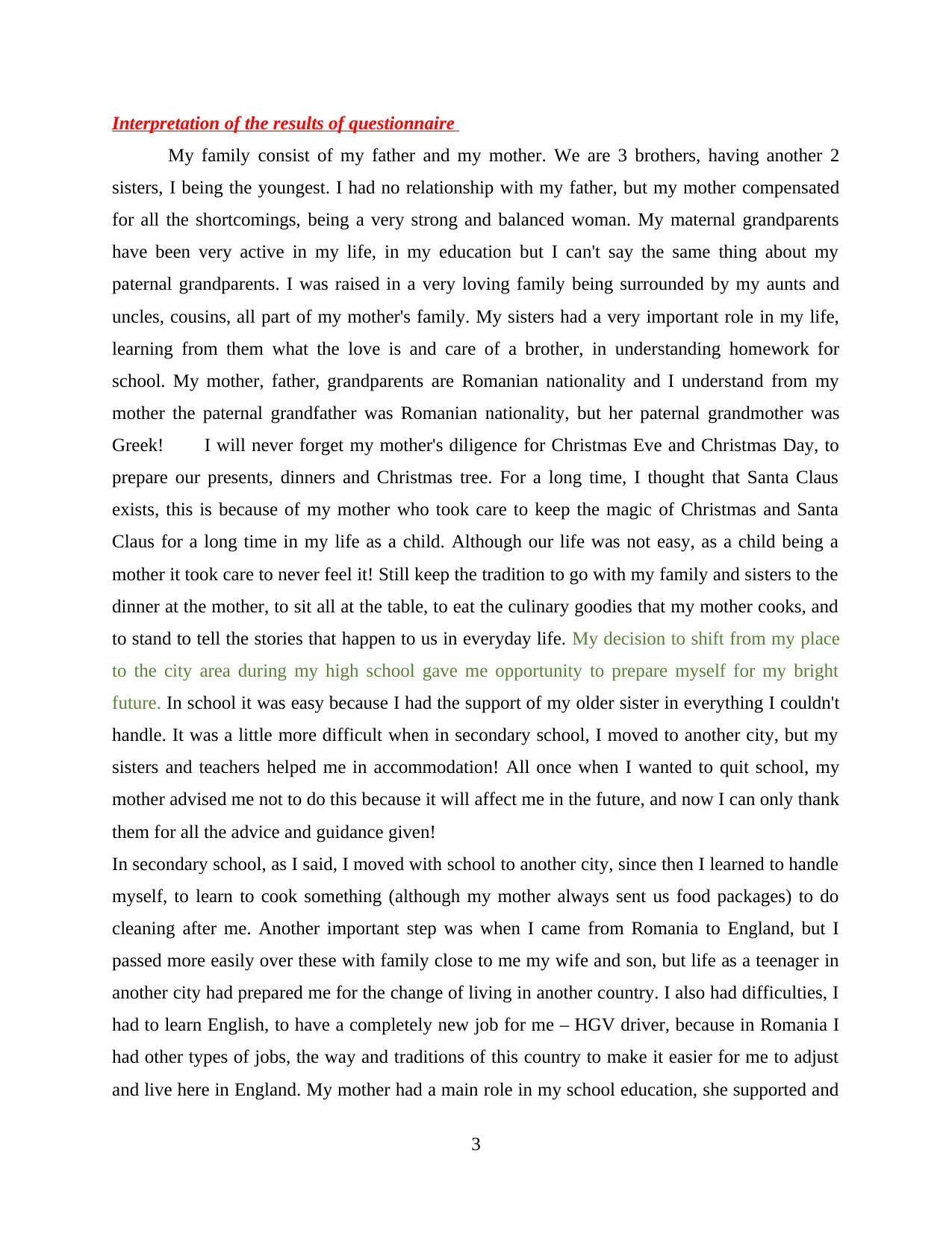
Interpretation of the results of questionnaire
My family consist of my father and my mother. We are 3 brothers, having another 2
sisters, I being the youngest. I had no relationship with my father, but my mother compensated
for all the shortcomings, being a very strong and balanced woman. My maternal grandparents
have been very active in my life, in my education but I can't say the same thing about my
paternal grandparents. I was raised in a very loving family being surrounded by my aunts and
uncles, cousins, all part of my mother's family. My sisters had a very important role in my life,
learning from them what the love is and care of a brother, in understanding homework for
school. My mother, father, grandparents are Romanian nationality and I understand from my
mother the paternal grandfather was Romanian nationality, but her paternal grandmother was
Greek! I will never forget my mother's diligence for Christmas Eve and Christmas Day, to
prepare our presents, dinners and Christmas tree. For a long time, I thought that Santa Claus
exists, this is because of my mother who took care to keep the magic of Christmas and Santa
Claus for a long time in my life as a child. Although our life was not easy, as a child being a
mother it took care to never feel it! Still keep the tradition to go with my family and sisters to the
dinner at the mother, to sit all at the table, to eat the culinary goodies that my mother cooks, and
to stand to tell the stories that happen to us in everyday life. My decision to shift from my place
to the city area during my high school gave me opportunity to prepare myself for my bright
future. In school it was easy because I had the support of my older sister in everything I couldn't
handle. It was a little more difficult when in secondary school, I moved to another city, but my
sisters and teachers helped me in accommodation! All once when I wanted to quit school, my
mother advised me not to do this because it will affect me in the future, and now I can only thank
them for all the advice and guidance given!
In secondary school, as I said, I moved with school to another city, since then I learned to handle
myself, to learn to cook something (although my mother always sent us food packages) to do
cleaning after me. Another important step was when I came from Romania to England, but I
passed more easily over these with family close to me my wife and son, but life as a teenager in
another city had prepared me for the change of living in another country. I also had difficulties, I
had to learn English, to have a completely new job for me – HGV driver, because in Romania I
had other types of jobs, the way and traditions of this country to make it easier for me to adjust
and live here in England. My mother had a main role in my school education, she supported and
3
My family consist of my father and my mother. We are 3 brothers, having another 2
sisters, I being the youngest. I had no relationship with my father, but my mother compensated
for all the shortcomings, being a very strong and balanced woman. My maternal grandparents
have been very active in my life, in my education but I can't say the same thing about my
paternal grandparents. I was raised in a very loving family being surrounded by my aunts and
uncles, cousins, all part of my mother's family. My sisters had a very important role in my life,
learning from them what the love is and care of a brother, in understanding homework for
school. My mother, father, grandparents are Romanian nationality and I understand from my
mother the paternal grandfather was Romanian nationality, but her paternal grandmother was
Greek! I will never forget my mother's diligence for Christmas Eve and Christmas Day, to
prepare our presents, dinners and Christmas tree. For a long time, I thought that Santa Claus
exists, this is because of my mother who took care to keep the magic of Christmas and Santa
Claus for a long time in my life as a child. Although our life was not easy, as a child being a
mother it took care to never feel it! Still keep the tradition to go with my family and sisters to the
dinner at the mother, to sit all at the table, to eat the culinary goodies that my mother cooks, and
to stand to tell the stories that happen to us in everyday life. My decision to shift from my place
to the city area during my high school gave me opportunity to prepare myself for my bright
future. In school it was easy because I had the support of my older sister in everything I couldn't
handle. It was a little more difficult when in secondary school, I moved to another city, but my
sisters and teachers helped me in accommodation! All once when I wanted to quit school, my
mother advised me not to do this because it will affect me in the future, and now I can only thank
them for all the advice and guidance given!
In secondary school, as I said, I moved with school to another city, since then I learned to handle
myself, to learn to cook something (although my mother always sent us food packages) to do
cleaning after me. Another important step was when I came from Romania to England, but I
passed more easily over these with family close to me my wife and son, but life as a teenager in
another city had prepared me for the change of living in another country. I also had difficulties, I
had to learn English, to have a completely new job for me – HGV driver, because in Romania I
had other types of jobs, the way and traditions of this country to make it easier for me to adjust
and live here in England. My mother had a main role in my school education, she supported and
3
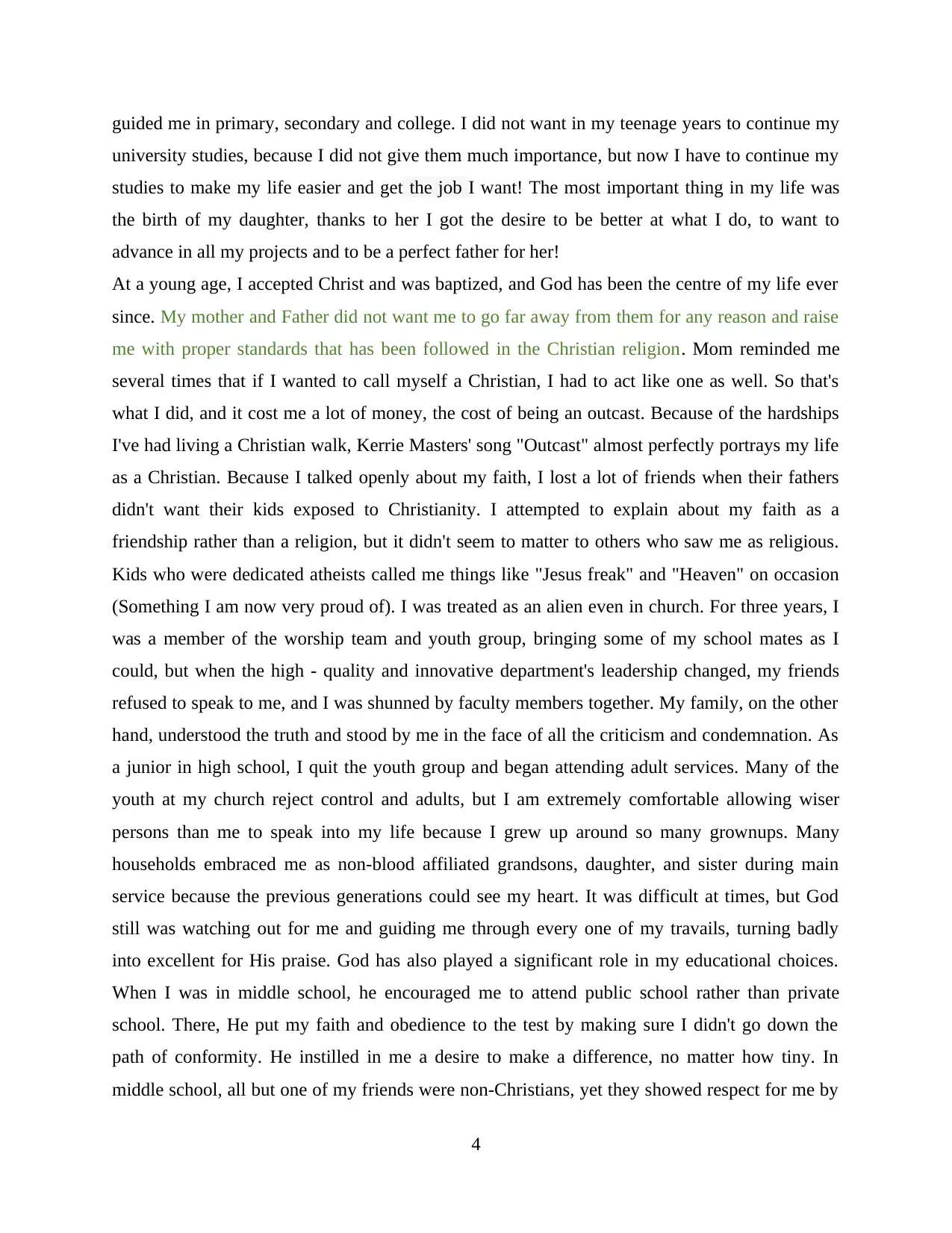
guided me in primary, secondary and college. I did not want in my teenage years to continue my
university studies, because I did not give them much importance, but now I have to continue my
studies to make my life easier and get the job I want! The most important thing in my life was
the birth of my daughter, thanks to her I got the desire to be better at what I do, to want to
advance in all my projects and to be a perfect father for her!
At a young age, I accepted Christ and was baptized, and God has been the centre of my life ever
since. My mother and Father did not want me to go far away from them for any reason and raise
me with proper standards that has been followed in the Christian religion. Mom reminded me
several times that if I wanted to call myself a Christian, I had to act like one as well. So that's
what I did, and it cost me a lot of money, the cost of being an outcast. Because of the hardships
I've had living a Christian walk, Kerrie Masters' song "Outcast" almost perfectly portrays my life
as a Christian. Because I talked openly about my faith, I lost a lot of friends when their fathers
didn't want their kids exposed to Christianity. I attempted to explain about my faith as a
friendship rather than a religion, but it didn't seem to matter to others who saw me as religious.
Kids who were dedicated atheists called me things like "Jesus freak" and "Heaven" on occasion
(Something I am now very proud of). I was treated as an alien even in church. For three years, I
was a member of the worship team and youth group, bringing some of my school mates as I
could, but when the high - quality and innovative department's leadership changed, my friends
refused to speak to me, and I was shunned by faculty members together. My family, on the other
hand, understood the truth and stood by me in the face of all the criticism and condemnation. As
a junior in high school, I quit the youth group and began attending adult services. Many of the
youth at my church reject control and adults, but I am extremely comfortable allowing wiser
persons than me to speak into my life because I grew up around so many grownups. Many
households embraced me as non-blood affiliated grandsons, daughter, and sister during main
service because the previous generations could see my heart. It was difficult at times, but God
still was watching out for me and guiding me through every one of my travails, turning badly
into excellent for His praise. God has also played a significant role in my educational choices.
When I was in middle school, he encouraged me to attend public school rather than private
school. There, He put my faith and obedience to the test by making sure I didn't go down the
path of conformity. He instilled in me a desire to make a difference, no matter how tiny. In
middle school, all but one of my friends were non-Christians, yet they showed respect for me by
4
university studies, because I did not give them much importance, but now I have to continue my
studies to make my life easier and get the job I want! The most important thing in my life was
the birth of my daughter, thanks to her I got the desire to be better at what I do, to want to
advance in all my projects and to be a perfect father for her!
At a young age, I accepted Christ and was baptized, and God has been the centre of my life ever
since. My mother and Father did not want me to go far away from them for any reason and raise
me with proper standards that has been followed in the Christian religion. Mom reminded me
several times that if I wanted to call myself a Christian, I had to act like one as well. So that's
what I did, and it cost me a lot of money, the cost of being an outcast. Because of the hardships
I've had living a Christian walk, Kerrie Masters' song "Outcast" almost perfectly portrays my life
as a Christian. Because I talked openly about my faith, I lost a lot of friends when their fathers
didn't want their kids exposed to Christianity. I attempted to explain about my faith as a
friendship rather than a religion, but it didn't seem to matter to others who saw me as religious.
Kids who were dedicated atheists called me things like "Jesus freak" and "Heaven" on occasion
(Something I am now very proud of). I was treated as an alien even in church. For three years, I
was a member of the worship team and youth group, bringing some of my school mates as I
could, but when the high - quality and innovative department's leadership changed, my friends
refused to speak to me, and I was shunned by faculty members together. My family, on the other
hand, understood the truth and stood by me in the face of all the criticism and condemnation. As
a junior in high school, I quit the youth group and began attending adult services. Many of the
youth at my church reject control and adults, but I am extremely comfortable allowing wiser
persons than me to speak into my life because I grew up around so many grownups. Many
households embraced me as non-blood affiliated grandsons, daughter, and sister during main
service because the previous generations could see my heart. It was difficult at times, but God
still was watching out for me and guiding me through every one of my travails, turning badly
into excellent for His praise. God has also played a significant role in my educational choices.
When I was in middle school, he encouraged me to attend public school rather than private
school. There, He put my faith and obedience to the test by making sure I didn't go down the
path of conformity. He instilled in me a desire to make a difference, no matter how tiny. In
middle school, all but one of my friends were non-Christians, yet they showed respect for me by
4
⊘ This is a preview!⊘
Do you want full access?
Subscribe today to unlock all pages.

Trusted by 1+ million students worldwide
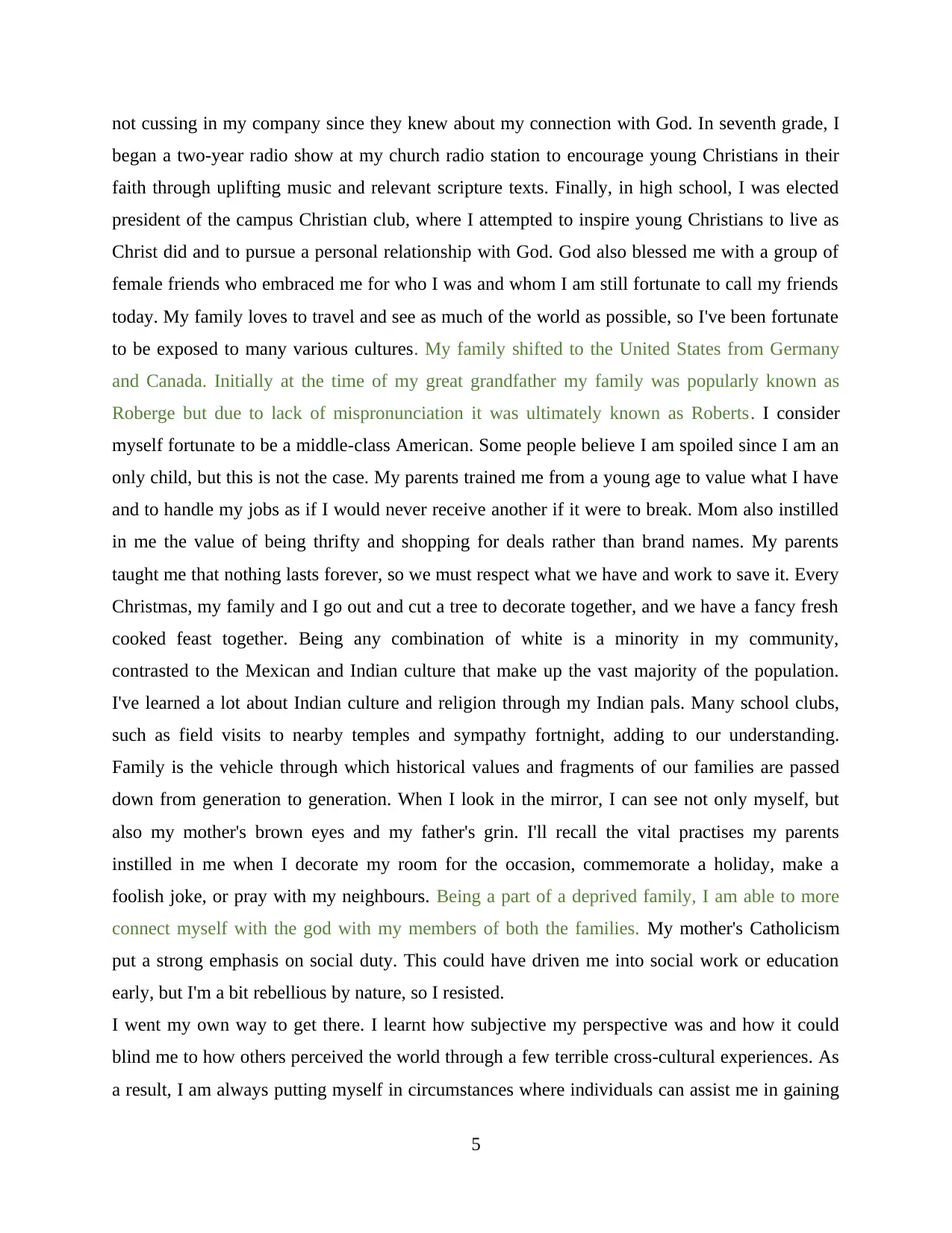
not cussing in my company since they knew about my connection with God. In seventh grade, I
began a two-year radio show at my church radio station to encourage young Christians in their
faith through uplifting music and relevant scripture texts. Finally, in high school, I was elected
president of the campus Christian club, where I attempted to inspire young Christians to live as
Christ did and to pursue a personal relationship with God. God also blessed me with a group of
female friends who embraced me for who I was and whom I am still fortunate to call my friends
today. My family loves to travel and see as much of the world as possible, so I've been fortunate
to be exposed to many various cultures. My family shifted to the United States from Germany
and Canada. Initially at the time of my great grandfather my family was popularly known as
Roberge but due to lack of mispronunciation it was ultimately known as Roberts. I consider
myself fortunate to be a middle-class American. Some people believe I am spoiled since I am an
only child, but this is not the case. My parents trained me from a young age to value what I have
and to handle my jobs as if I would never receive another if it were to break. Mom also instilled
in me the value of being thrifty and shopping for deals rather than brand names. My parents
taught me that nothing lasts forever, so we must respect what we have and work to save it. Every
Christmas, my family and I go out and cut a tree to decorate together, and we have a fancy fresh
cooked feast together. Being any combination of white is a minority in my community,
contrasted to the Mexican and Indian culture that make up the vast majority of the population.
I've learned a lot about Indian culture and religion through my Indian pals. Many school clubs,
such as field visits to nearby temples and sympathy fortnight, adding to our understanding.
Family is the vehicle through which historical values and fragments of our families are passed
down from generation to generation. When I look in the mirror, I can see not only myself, but
also my mother's brown eyes and my father's grin. I'll recall the vital practises my parents
instilled in me when I decorate my room for the occasion, commemorate a holiday, make a
foolish joke, or pray with my neighbours. Being a part of a deprived family, I am able to more
connect myself with the god with my members of both the families. My mother's Catholicism
put a strong emphasis on social duty. This could have driven me into social work or education
early, but I'm a bit rebellious by nature, so I resisted.
I went my own way to get there. I learnt how subjective my perspective was and how it could
blind me to how others perceived the world through a few terrible cross-cultural experiences. As
a result, I am always putting myself in circumstances where individuals can assist me in gaining
5
began a two-year radio show at my church radio station to encourage young Christians in their
faith through uplifting music and relevant scripture texts. Finally, in high school, I was elected
president of the campus Christian club, where I attempted to inspire young Christians to live as
Christ did and to pursue a personal relationship with God. God also blessed me with a group of
female friends who embraced me for who I was and whom I am still fortunate to call my friends
today. My family loves to travel and see as much of the world as possible, so I've been fortunate
to be exposed to many various cultures. My family shifted to the United States from Germany
and Canada. Initially at the time of my great grandfather my family was popularly known as
Roberge but due to lack of mispronunciation it was ultimately known as Roberts. I consider
myself fortunate to be a middle-class American. Some people believe I am spoiled since I am an
only child, but this is not the case. My parents trained me from a young age to value what I have
and to handle my jobs as if I would never receive another if it were to break. Mom also instilled
in me the value of being thrifty and shopping for deals rather than brand names. My parents
taught me that nothing lasts forever, so we must respect what we have and work to save it. Every
Christmas, my family and I go out and cut a tree to decorate together, and we have a fancy fresh
cooked feast together. Being any combination of white is a minority in my community,
contrasted to the Mexican and Indian culture that make up the vast majority of the population.
I've learned a lot about Indian culture and religion through my Indian pals. Many school clubs,
such as field visits to nearby temples and sympathy fortnight, adding to our understanding.
Family is the vehicle through which historical values and fragments of our families are passed
down from generation to generation. When I look in the mirror, I can see not only myself, but
also my mother's brown eyes and my father's grin. I'll recall the vital practises my parents
instilled in me when I decorate my room for the occasion, commemorate a holiday, make a
foolish joke, or pray with my neighbours. Being a part of a deprived family, I am able to more
connect myself with the god with my members of both the families. My mother's Catholicism
put a strong emphasis on social duty. This could have driven me into social work or education
early, but I'm a bit rebellious by nature, so I resisted.
I went my own way to get there. I learnt how subjective my perspective was and how it could
blind me to how others perceived the world through a few terrible cross-cultural experiences. As
a result, I am always putting myself in circumstances where individuals can assist me in gaining
5
Paraphrase This Document
Need a fresh take? Get an instant paraphrase of this document with our AI Paraphraser
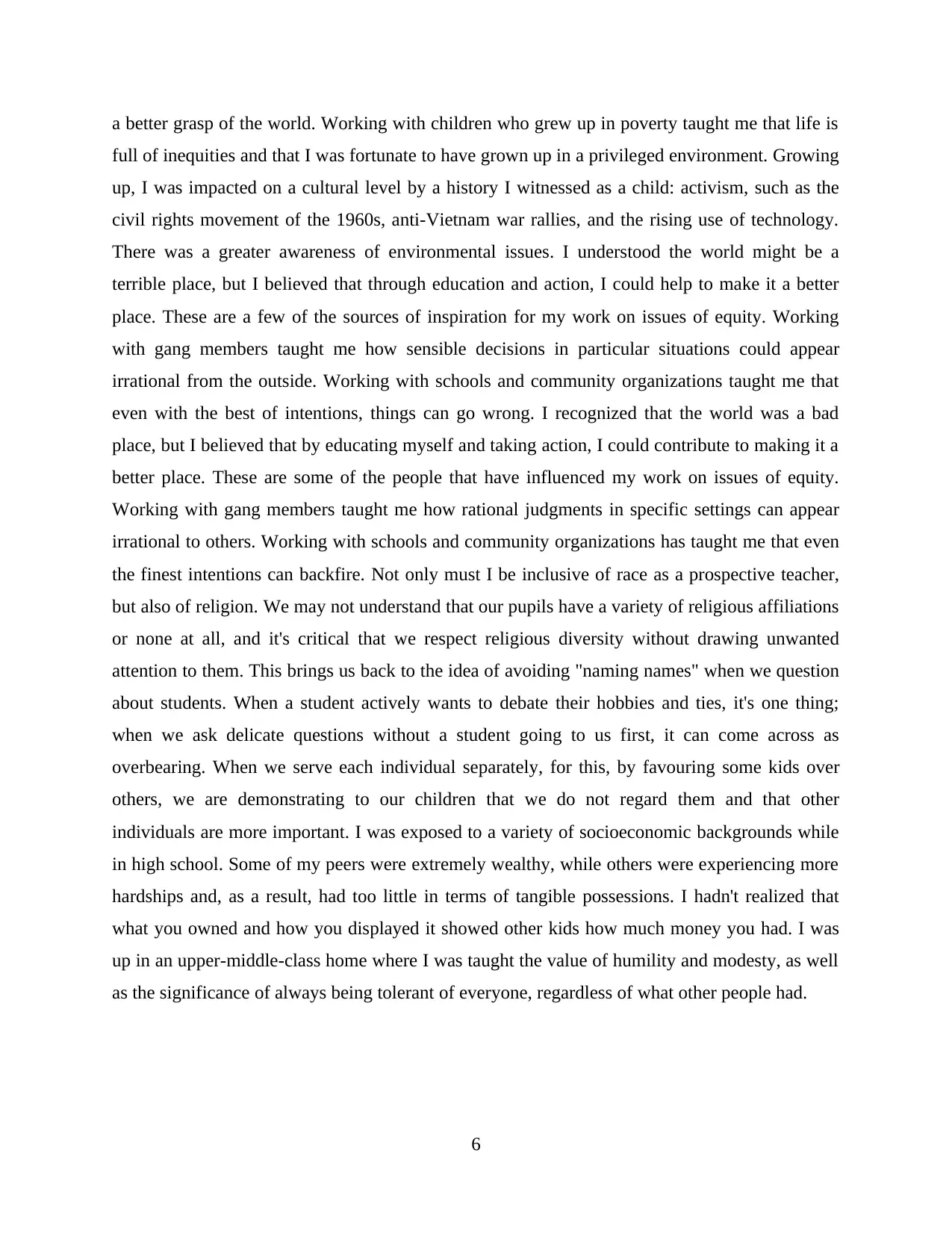
a better grasp of the world. Working with children who grew up in poverty taught me that life is
full of inequities and that I was fortunate to have grown up in a privileged environment. Growing
up, I was impacted on a cultural level by a history I witnessed as a child: activism, such as the
civil rights movement of the 1960s, anti-Vietnam war rallies, and the rising use of technology.
There was a greater awareness of environmental issues. I understood the world might be a
terrible place, but I believed that through education and action, I could help to make it a better
place. These are a few of the sources of inspiration for my work on issues of equity. Working
with gang members taught me how sensible decisions in particular situations could appear
irrational from the outside. Working with schools and community organizations taught me that
even with the best of intentions, things can go wrong. I recognized that the world was a bad
place, but I believed that by educating myself and taking action, I could contribute to making it a
better place. These are some of the people that have influenced my work on issues of equity.
Working with gang members taught me how rational judgments in specific settings can appear
irrational to others. Working with schools and community organizations has taught me that even
the finest intentions can backfire. Not only must I be inclusive of race as a prospective teacher,
but also of religion. We may not understand that our pupils have a variety of religious affiliations
or none at all, and it's critical that we respect religious diversity without drawing unwanted
attention to them. This brings us back to the idea of avoiding "naming names" when we question
about students. When a student actively wants to debate their hobbies and ties, it's one thing;
when we ask delicate questions without a student going to us first, it can come across as
overbearing. When we serve each individual separately, for this, by favouring some kids over
others, we are demonstrating to our children that we do not regard them and that other
individuals are more important. I was exposed to a variety of socioeconomic backgrounds while
in high school. Some of my peers were extremely wealthy, while others were experiencing more
hardships and, as a result, had too little in terms of tangible possessions. I hadn't realized that
what you owned and how you displayed it showed other kids how much money you had. I was
up in an upper-middle-class home where I was taught the value of humility and modesty, as well
as the significance of always being tolerant of everyone, regardless of what other people had.
6
full of inequities and that I was fortunate to have grown up in a privileged environment. Growing
up, I was impacted on a cultural level by a history I witnessed as a child: activism, such as the
civil rights movement of the 1960s, anti-Vietnam war rallies, and the rising use of technology.
There was a greater awareness of environmental issues. I understood the world might be a
terrible place, but I believed that through education and action, I could help to make it a better
place. These are a few of the sources of inspiration for my work on issues of equity. Working
with gang members taught me how sensible decisions in particular situations could appear
irrational from the outside. Working with schools and community organizations taught me that
even with the best of intentions, things can go wrong. I recognized that the world was a bad
place, but I believed that by educating myself and taking action, I could contribute to making it a
better place. These are some of the people that have influenced my work on issues of equity.
Working with gang members taught me how rational judgments in specific settings can appear
irrational to others. Working with schools and community organizations has taught me that even
the finest intentions can backfire. Not only must I be inclusive of race as a prospective teacher,
but also of religion. We may not understand that our pupils have a variety of religious affiliations
or none at all, and it's critical that we respect religious diversity without drawing unwanted
attention to them. This brings us back to the idea of avoiding "naming names" when we question
about students. When a student actively wants to debate their hobbies and ties, it's one thing;
when we ask delicate questions without a student going to us first, it can come across as
overbearing. When we serve each individual separately, for this, by favouring some kids over
others, we are demonstrating to our children that we do not regard them and that other
individuals are more important. I was exposed to a variety of socioeconomic backgrounds while
in high school. Some of my peers were extremely wealthy, while others were experiencing more
hardships and, as a result, had too little in terms of tangible possessions. I hadn't realized that
what you owned and how you displayed it showed other kids how much money you had. I was
up in an upper-middle-class home where I was taught the value of humility and modesty, as well
as the significance of always being tolerant of everyone, regardless of what other people had.
6
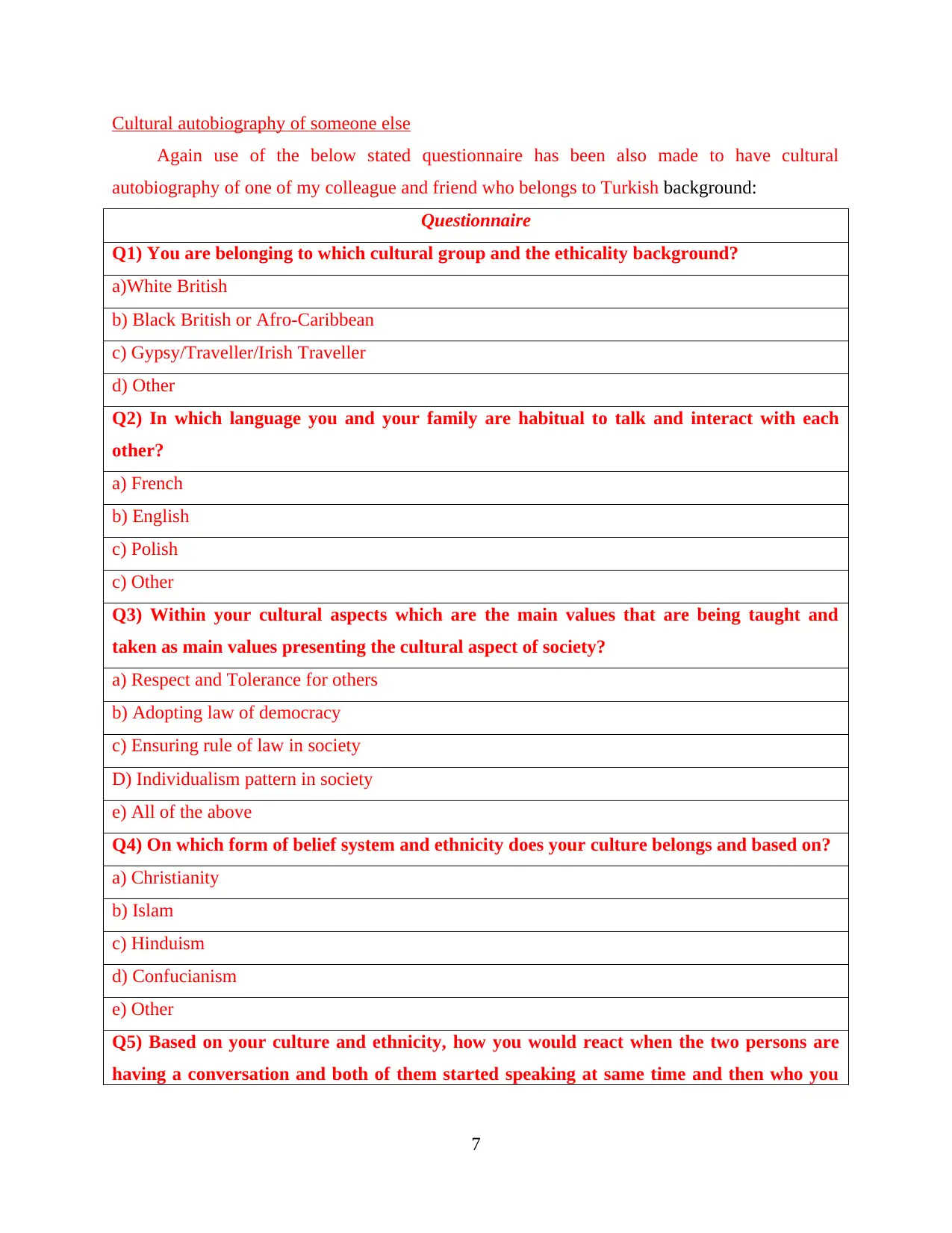
Cultural autobiography of someone else
Again use of the below stated questionnaire has been also made to have cultural
autobiography of one of my colleague and friend who belongs to Turkish background:
Questionnaire
Q1) You are belonging to which cultural group and the ethicality background?
a)White British
b) Black British or Afro-Caribbean
c) Gypsy/Traveller/Irish Traveller
d) Other
Q2) In which language you and your family are habitual to talk and interact with each
other?
a) French
b) English
c) Polish
c) Other
Q3) Within your cultural aspects which are the main values that are being taught and
taken as main values presenting the cultural aspect of society?
a) Respect and Tolerance for others
b) Adopting law of democracy
c) Ensuring rule of law in society
D) Individualism pattern in society
e) All of the above
Q4) On which form of belief system and ethnicity does your culture belongs and based on?
a) Christianity
b) Islam
c) Hinduism
d) Confucianism
e) Other
Q5) Based on your culture and ethnicity, how you would react when the two persons are
having a conversation and both of them started speaking at same time and then who you
7
Again use of the below stated questionnaire has been also made to have cultural
autobiography of one of my colleague and friend who belongs to Turkish background:
Questionnaire
Q1) You are belonging to which cultural group and the ethicality background?
a)White British
b) Black British or Afro-Caribbean
c) Gypsy/Traveller/Irish Traveller
d) Other
Q2) In which language you and your family are habitual to talk and interact with each
other?
a) French
b) English
c) Polish
c) Other
Q3) Within your cultural aspects which are the main values that are being taught and
taken as main values presenting the cultural aspect of society?
a) Respect and Tolerance for others
b) Adopting law of democracy
c) Ensuring rule of law in society
D) Individualism pattern in society
e) All of the above
Q4) On which form of belief system and ethnicity does your culture belongs and based on?
a) Christianity
b) Islam
c) Hinduism
d) Confucianism
e) Other
Q5) Based on your culture and ethnicity, how you would react when the two persons are
having a conversation and both of them started speaking at same time and then who you
7
⊘ This is a preview!⊘
Do you want full access?
Subscribe today to unlock all pages.

Trusted by 1+ million students worldwide
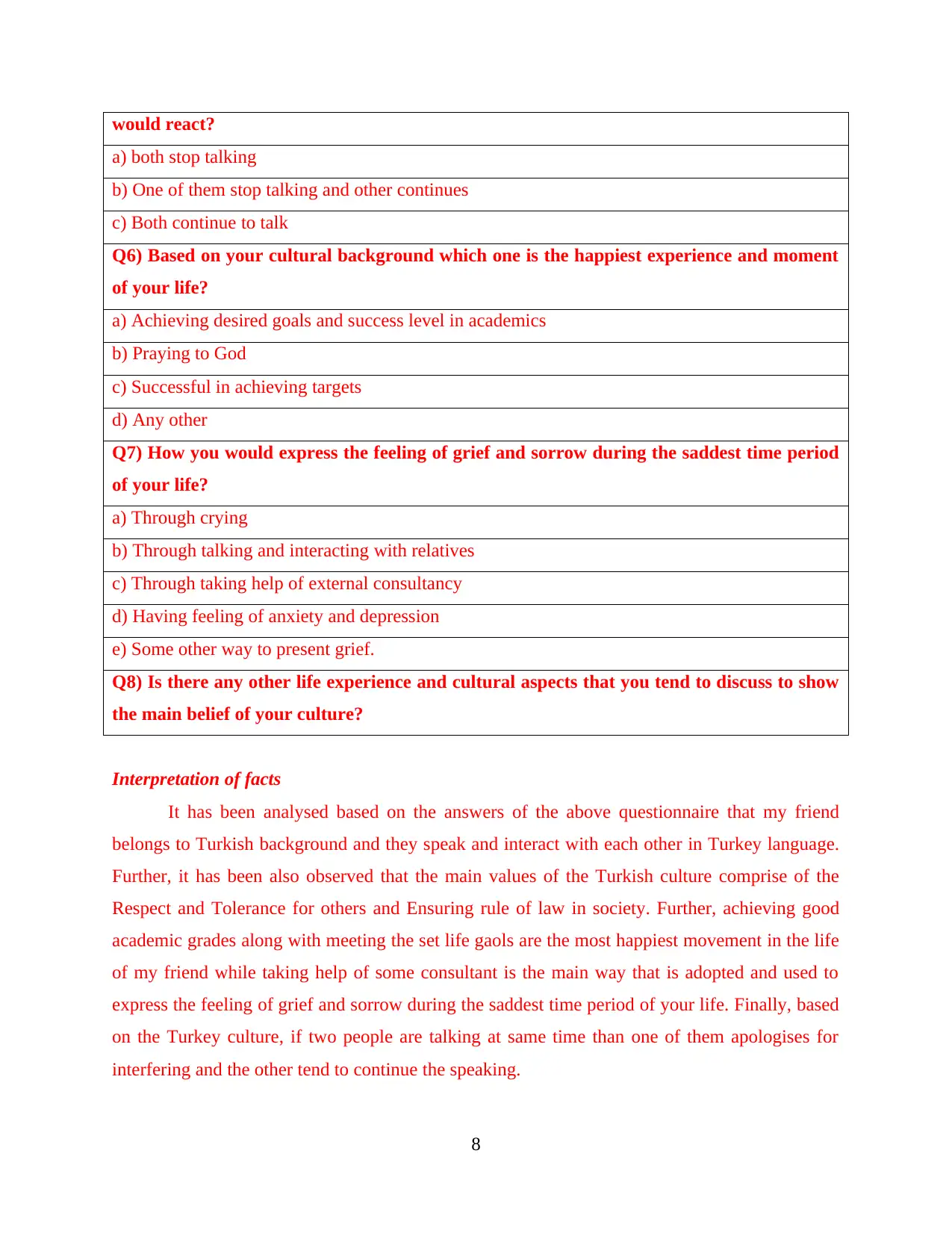
would react?
a) both stop talking
b) One of them stop talking and other continues
c) Both continue to talk
Q6) Based on your cultural background which one is the happiest experience and moment
of your life?
a) Achieving desired goals and success level in academics
b) Praying to God
c) Successful in achieving targets
d) Any other
Q7) How you would express the feeling of grief and sorrow during the saddest time period
of your life?
a) Through crying
b) Through talking and interacting with relatives
c) Through taking help of external consultancy
d) Having feeling of anxiety and depression
e) Some other way to present grief.
Q8) Is there any other life experience and cultural aspects that you tend to discuss to show
the main belief of your culture?
Interpretation of facts
It has been analysed based on the answers of the above questionnaire that my friend
belongs to Turkish background and they speak and interact with each other in Turkey language.
Further, it has been also observed that the main values of the Turkish culture comprise of the
Respect and Tolerance for others and Ensuring rule of law in society. Further, achieving good
academic grades along with meeting the set life gaols are the most happiest movement in the life
of my friend while taking help of some consultant is the main way that is adopted and used to
express the feeling of grief and sorrow during the saddest time period of your life. Finally, based
on the Turkey culture, if two people are talking at same time than one of them apologises for
interfering and the other tend to continue the speaking.
8
a) both stop talking
b) One of them stop talking and other continues
c) Both continue to talk
Q6) Based on your cultural background which one is the happiest experience and moment
of your life?
a) Achieving desired goals and success level in academics
b) Praying to God
c) Successful in achieving targets
d) Any other
Q7) How you would express the feeling of grief and sorrow during the saddest time period
of your life?
a) Through crying
b) Through talking and interacting with relatives
c) Through taking help of external consultancy
d) Having feeling of anxiety and depression
e) Some other way to present grief.
Q8) Is there any other life experience and cultural aspects that you tend to discuss to show
the main belief of your culture?
Interpretation of facts
It has been analysed based on the answers of the above questionnaire that my friend
belongs to Turkish background and they speak and interact with each other in Turkey language.
Further, it has been also observed that the main values of the Turkish culture comprise of the
Respect and Tolerance for others and Ensuring rule of law in society. Further, achieving good
academic grades along with meeting the set life gaols are the most happiest movement in the life
of my friend while taking help of some consultant is the main way that is adopted and used to
express the feeling of grief and sorrow during the saddest time period of your life. Finally, based
on the Turkey culture, if two people are talking at same time than one of them apologises for
interfering and the other tend to continue the speaking.
8
Paraphrase This Document
Need a fresh take? Get an instant paraphrase of this document with our AI Paraphraser
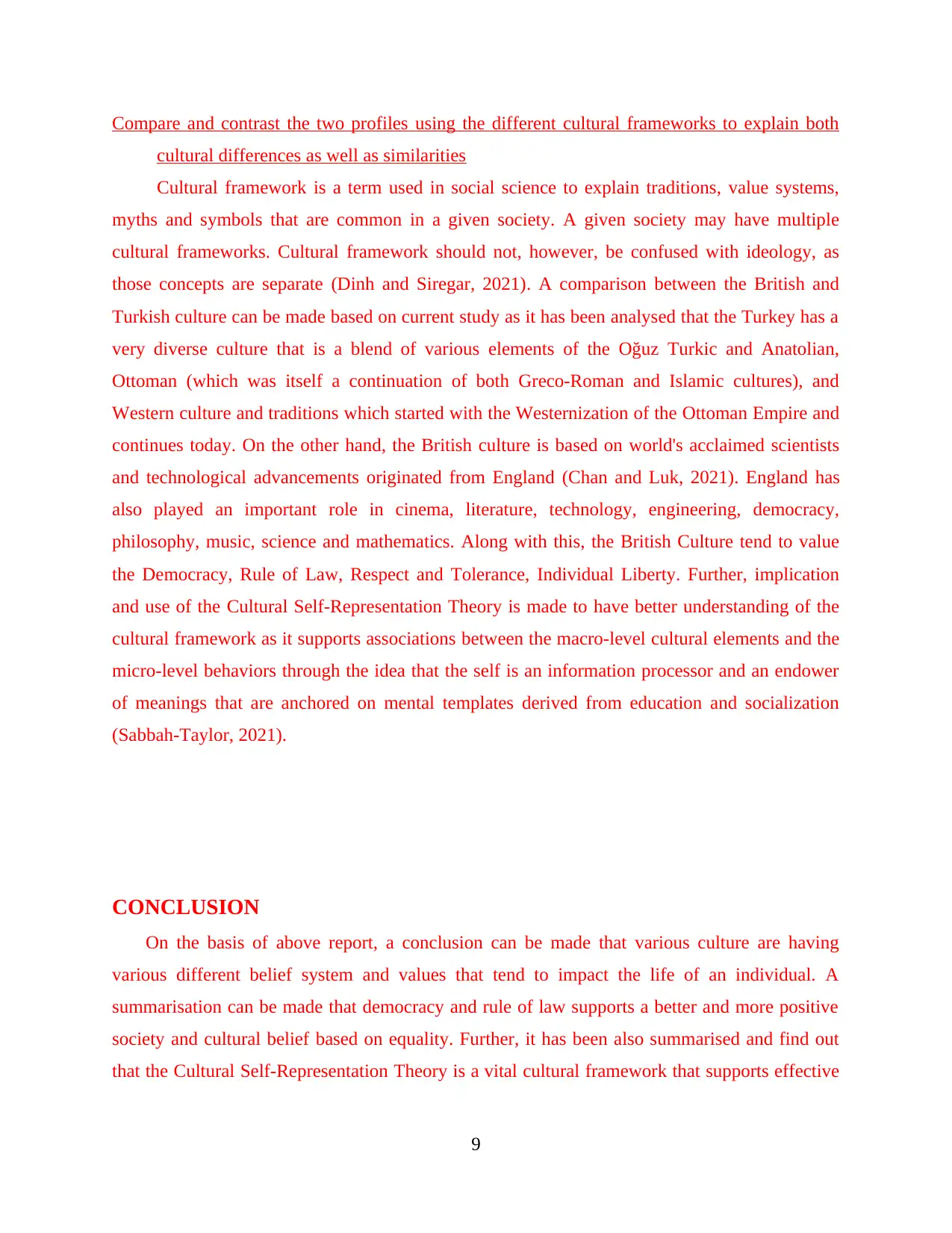
Compare and contrast the two profiles using the different cultural frameworks to explain both
cultural differences as well as similarities
Cultural framework is a term used in social science to explain traditions, value systems,
myths and symbols that are common in a given society. A given society may have multiple
cultural frameworks. Cultural framework should not, however, be confused with ideology, as
those concepts are separate (Dinh and Siregar, 2021). A comparison between the British and
Turkish culture can be made based on current study as it has been analysed that the Turkey has a
very diverse culture that is a blend of various elements of the Oğuz Turkic and Anatolian,
Ottoman (which was itself a continuation of both Greco-Roman and Islamic cultures), and
Western culture and traditions which started with the Westernization of the Ottoman Empire and
continues today. On the other hand, the British culture is based on world's acclaimed scientists
and technological advancements originated from England (Chan and Luk, 2021). England has
also played an important role in cinema, literature, technology, engineering, democracy,
philosophy, music, science and mathematics. Along with this, the British Culture tend to value
the Democracy, Rule of Law, Respect and Tolerance, Individual Liberty. Further, implication
and use of the Cultural Self-Representation Theory is made to have better understanding of the
cultural framework as it supports associations between the macro-level cultural elements and the
micro-level behaviors through the idea that the self is an information processor and an endower
of meanings that are anchored on mental templates derived from education and socialization
(Sabbah-Taylor, 2021).
CONCLUSION
On the basis of above report, a conclusion can be made that various culture are having
various different belief system and values that tend to impact the life of an individual. A
summarisation can be made that democracy and rule of law supports a better and more positive
society and cultural belief based on equality. Further, it has been also summarised and find out
that the Cultural Self-Representation Theory is a vital cultural framework that supports effective
9
cultural differences as well as similarities
Cultural framework is a term used in social science to explain traditions, value systems,
myths and symbols that are common in a given society. A given society may have multiple
cultural frameworks. Cultural framework should not, however, be confused with ideology, as
those concepts are separate (Dinh and Siregar, 2021). A comparison between the British and
Turkish culture can be made based on current study as it has been analysed that the Turkey has a
very diverse culture that is a blend of various elements of the Oğuz Turkic and Anatolian,
Ottoman (which was itself a continuation of both Greco-Roman and Islamic cultures), and
Western culture and traditions which started with the Westernization of the Ottoman Empire and
continues today. On the other hand, the British culture is based on world's acclaimed scientists
and technological advancements originated from England (Chan and Luk, 2021). England has
also played an important role in cinema, literature, technology, engineering, democracy,
philosophy, music, science and mathematics. Along with this, the British Culture tend to value
the Democracy, Rule of Law, Respect and Tolerance, Individual Liberty. Further, implication
and use of the Cultural Self-Representation Theory is made to have better understanding of the
cultural framework as it supports associations between the macro-level cultural elements and the
micro-level behaviors through the idea that the self is an information processor and an endower
of meanings that are anchored on mental templates derived from education and socialization
(Sabbah-Taylor, 2021).
CONCLUSION
On the basis of above report, a conclusion can be made that various culture are having
various different belief system and values that tend to impact the life of an individual. A
summarisation can be made that democracy and rule of law supports a better and more positive
society and cultural belief based on equality. Further, it has been also summarised and find out
that the Cultural Self-Representation Theory is a vital cultural framework that supports effective
9
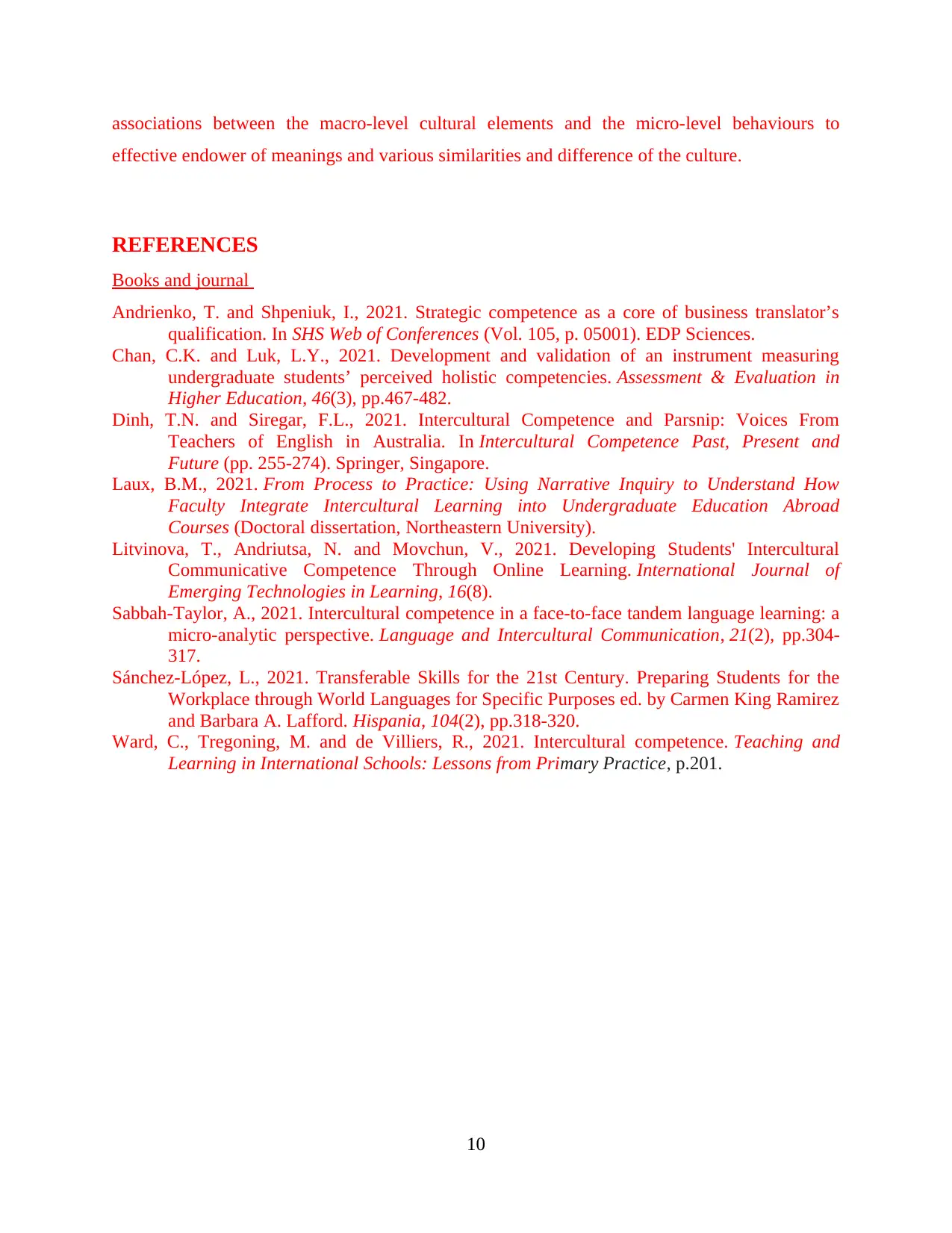
associations between the macro-level cultural elements and the micro-level behaviours to
effective endower of meanings and various similarities and difference of the culture.
REFERENCES
Books and journal
Andrienko, T. and Shpeniuk, I., 2021. Strategic competence as a core of business translator’s
qualification. In SHS Web of Conferences (Vol. 105, p. 05001). EDP Sciences.
Chan, C.K. and Luk, L.Y., 2021. Development and validation of an instrument measuring
undergraduate students’ perceived holistic competencies. Assessment & Evaluation in
Higher Education, 46(3), pp.467-482.
Dinh, T.N. and Siregar, F.L., 2021. Intercultural Competence and Parsnip: Voices From
Teachers of English in Australia. In Intercultural Competence Past, Present and
Future (pp. 255-274). Springer, Singapore.
Laux, B.M., 2021. From Process to Practice: Using Narrative Inquiry to Understand How
Faculty Integrate Intercultural Learning into Undergraduate Education Abroad
Courses (Doctoral dissertation, Northeastern University).
Litvinova, T., Andriutsa, N. and Movchun, V., 2021. Developing Students' Intercultural
Communicative Competence Through Online Learning. International Journal of
Emerging Technologies in Learning, 16(8).
Sabbah-Taylor, A., 2021. Intercultural competence in a face-to-face tandem language learning: a
micro-analytic perspective. Language and Intercultural Communication, 21(2), pp.304-
317.
Sánchez-López, L., 2021. Transferable Skills for the 21st Century. Preparing Students for the
Workplace through World Languages for Specific Purposes ed. by Carmen King Ramirez
and Barbara A. Lafford. Hispania, 104(2), pp.318-320.
Ward, C., Tregoning, M. and de Villiers, R., 2021. Intercultural competence. Teaching and
Learning in International Schools: Lessons from Primary Practice, p.201.
10
effective endower of meanings and various similarities and difference of the culture.
REFERENCES
Books and journal
Andrienko, T. and Shpeniuk, I., 2021. Strategic competence as a core of business translator’s
qualification. In SHS Web of Conferences (Vol. 105, p. 05001). EDP Sciences.
Chan, C.K. and Luk, L.Y., 2021. Development and validation of an instrument measuring
undergraduate students’ perceived holistic competencies. Assessment & Evaluation in
Higher Education, 46(3), pp.467-482.
Dinh, T.N. and Siregar, F.L., 2021. Intercultural Competence and Parsnip: Voices From
Teachers of English in Australia. In Intercultural Competence Past, Present and
Future (pp. 255-274). Springer, Singapore.
Laux, B.M., 2021. From Process to Practice: Using Narrative Inquiry to Understand How
Faculty Integrate Intercultural Learning into Undergraduate Education Abroad
Courses (Doctoral dissertation, Northeastern University).
Litvinova, T., Andriutsa, N. and Movchun, V., 2021. Developing Students' Intercultural
Communicative Competence Through Online Learning. International Journal of
Emerging Technologies in Learning, 16(8).
Sabbah-Taylor, A., 2021. Intercultural competence in a face-to-face tandem language learning: a
micro-analytic perspective. Language and Intercultural Communication, 21(2), pp.304-
317.
Sánchez-López, L., 2021. Transferable Skills for the 21st Century. Preparing Students for the
Workplace through World Languages for Specific Purposes ed. by Carmen King Ramirez
and Barbara A. Lafford. Hispania, 104(2), pp.318-320.
Ward, C., Tregoning, M. and de Villiers, R., 2021. Intercultural competence. Teaching and
Learning in International Schools: Lessons from Primary Practice, p.201.
10
⊘ This is a preview!⊘
Do you want full access?
Subscribe today to unlock all pages.

Trusted by 1+ million students worldwide
1 out of 12
Related Documents
Your All-in-One AI-Powered Toolkit for Academic Success.
+13062052269
info@desklib.com
Available 24*7 on WhatsApp / Email
![[object Object]](/_next/static/media/star-bottom.7253800d.svg)
Unlock your academic potential
Copyright © 2020–2026 A2Z Services. All Rights Reserved. Developed and managed by ZUCOL.





